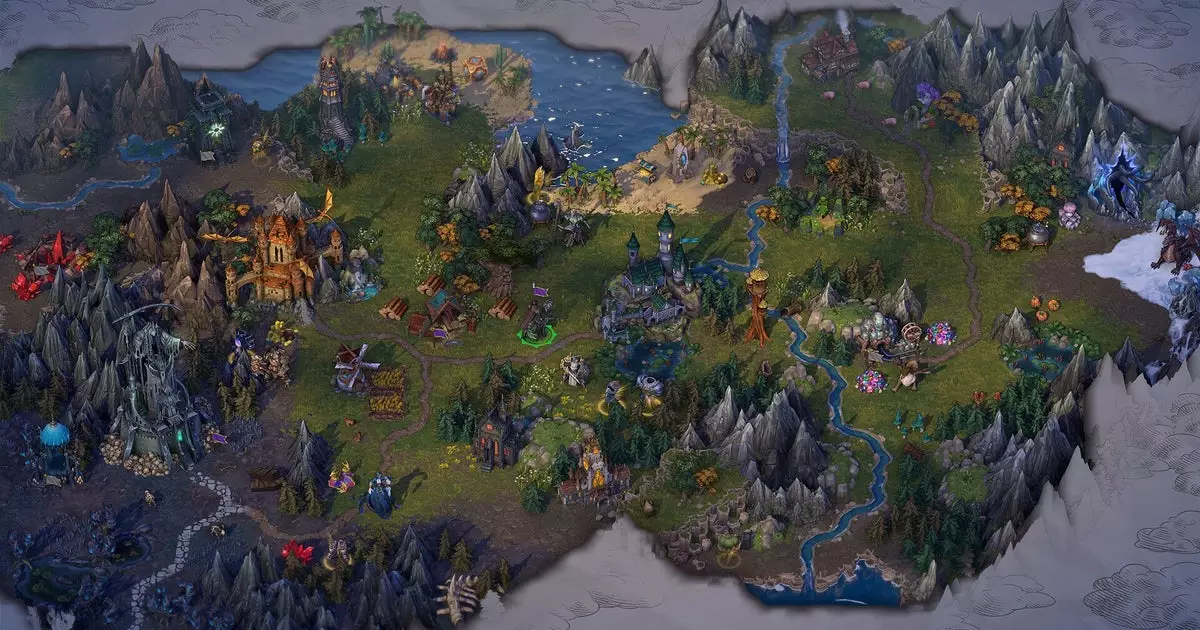In the ever-evolving landscape of the gaming industry, publishers often keep their core projects cloaked in secrecy, using strategic partnerships to navigate the complexities of market demands. Ubisoft’s recent decision to entrust the publishing of “Heroes of Might and Magic: Olden Era” to Hooded Horse signifies more than just a contractual shift; it reflects a fundamental change in how major companies approach legacy titles and their overall brand management. While at face value, handing over the task of marketing and distribution might appear like a simple business arrangement, on a deeper level, it raises questions about Ubisoft’s internal strategies and their long-term vision for iconic franchises.
Instead of solely relying on their established infrastructure, Ubisoft’s collaboration with Hooded Horse suggests a calculated retreat from traditional publishing roles, possibly to free up resources or to test the waters with smaller, more nimble publishers. This move could be driven by a desire to streamline operations, reduce costs, or even reassess the future of certain franchises in an increasingly competitive digital environment. Such strategic outsourcing hints at a broader industry trend: the consolidation of niche expertise within specialized publishers who understand the nuances of certain genres better than behemoths sometimes do.
The Power Dynamics Behind the Deal
What stands out most about this collaboration is the apparent respect for Hooded Horse’s expertise. Alain Corre, Ubisoft’s chief publishing officer, lauds their passion and connectivity with the strategy community, implying a recognition that specialized publishers often command more credibility within specific niches. Meanwhile, Hooded Horse’s CEO, Tim Bender, exudes confidence, framing this partnership as a “unique relationship” that benefits both sides.
This relationship appears to serve Ubisoft’s strategic interests without relinquishing control over the franchise. Ubisoft retains ownership of the “Heroes” IP, positioning itself as an overseer, while Hooded Horse takes on the operational load—handling marketing, regional releases, and publisher-specific activities. This division of labor illustrates a broader trend in global gaming where big publishers partner with smaller entities to capitalize on their strengths—speed, niche market understanding, and agility—without diluting their own brand or overextending resources.
Yet, the question remains: why now? Ubisoft has historically kept tight control over its flagship franchises. The recent split into separate entities, coupled with warnings of delays and cost-cutting measures, suggests that this move might be part of a strategic retreat driven by internal restructuring and necessity rather than enthusiasm. Their internal factions, juggling blockbuster titles like Assassin’s Creed and Rayman, might be deprioritizing older or less commercially guaranteed projects, choosing instead to offload the burden to publishers like Hooded Horse who can breathe new life into them with targeted marketing.
Implications for the Legacy of Heroes of Might and Magic
“Heroes of Might and Magic: Olden Era” aims to resurrect a beloved series rooted in the late 20th century—a prequel thick with lore that might intimidate modern players unfamiliar with its origins. The game’s delay and its positioning as a return to the franchise’s roots symbolize a cautious attempt to rekindle nostalgic appeal. But it also underscores the challenge Ubisoft faces: how do you modernize a classic without alienating longtime fans or overwhelming new ones with decades of lore?
Choosing Hooded Horse, a publisher known for strategical titles that appeal to niche audiences, signals Ubisoft’s recognition that this game likely requires a different marketing approach—one that appeals directly to hardcore strategy enthusiasts. The partnership hints at a strategy where Ubisoft distances itself from “Heroes” in particular, treating it as a specialized product rather than a flagship franchise. This shift could either rejuvenate the series if executed well or marginalize it if the new direction fails to resonate.
Personally, the cautious optimism is tinged with skepticism. Games like these often suffer from modern recalibrations that can erode what made the originals special. The risk is that by handing over the publishing reins to a smaller, possibly more experimental publisher, the franchise may be perceived as less prestigious—an artifact of nostalgic gamers rather than a mainstay of Ubisoft’s grand portfolio.
Overall, this partnership serves as a microcosm of larger industry movements: the search for efficiency amid uncertainty, the valorization of niche expertise, and the delicate balancing act of heritage preservation versus innovation. Whether this collaboration will breathe new life into “Heroes of Might and Magic” or serve as a cautionary tale for over-reliance on external partners remains to be seen, but it undeniably exemplifies the shifting power dynamics within the world of video game publishing.

